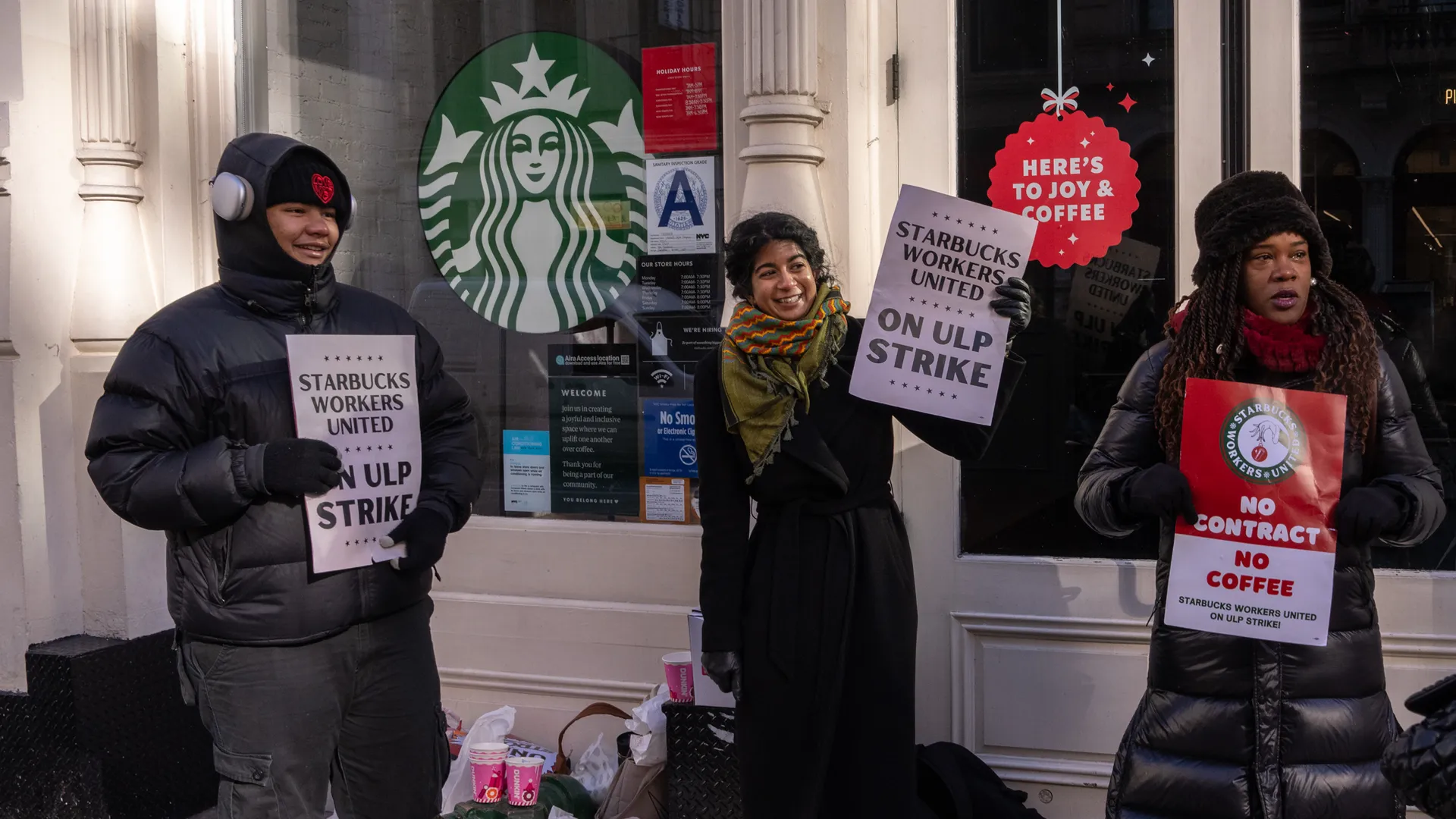The Starbucks baristas strike is spreading to more cities, leaving dozens of stores shut on Christmas Eve — the last day of the five-day walkout.
Why it matters: The escalating strikes are taking place during one of the coffee giant’s busiest periods.
- Starbucks Workers United, the union representing baristas, said some 300 stores closed as 5,000 workers went on strike across 43 states Tuesday.
- Starbucks disputes the union’s closure figure, saying only 170 stores shut on Tuesday, with 60 closed on Monday.
State of play: The strike that began in Chicago, Los Angeles and Seattle last Friday had expanded to cities including New York, Boston, Philadelphia, Dallas and Los Angeles by Monday.
- Starbucks Workers United said Atlanta and Buffalo will on Tuesday be among the cities joining the biggest-ever strike against the company, per the Washington Post.
Driving the news: Contract negotiations between the two sides that have been ongoing since April broke down after the union said Starbucks’ offers were not economically viable, per Axios’ Emily Peck.
- The union said its workers are striking to “win fair raises, benefits and staffing, protest unfair labor practices, and resolve outstanding litigation with Starbucks.”
- Starbucks has said Workers United’s proposals calling for “an immediate increase in the minimum wage of hourly partners by 64%, and by 77% over the life of a three-year contract” are “not sustainable.”
- What they’re saying: Sara Kelly, executive vice president and chief partner officer, said in a statement that while Workers United will seek to cause more stores to close, the work stoppages would have “a very limited impact to our overall operations.”
- That’s because 97-99% of stores would continue to operate, according to Kelly, who said Starbucks “offers a competitive average pay of over $18 per hour, and best-in-class benefits” that include health care, free college tuition and paid family leave.
Zoom out: 535 of the 10,000 U.S. Starbucks stores have unionized since 2021.
- Representatives for the union did not immediately respond to Axios’ requests for comment in the evening.
- Flashback: Starbucks workers strike at 200 union stores on Red Cup Day
Editor’s note: This story has been updated with additional developments.
- A handful of unionized Starbucks workers in three cities went on strike Friday morning, the first day of a work stoppage meant to last through Christmas Eve.
Why it matters: The strikes are timed for one of the coffee giant’s busiest seasons of the year at stores in three big markets: Chicago, Los Angeles and Seattle.
- So far, though, they’re only affecting a tiny number of stores in those cities.
State of play: Contract negotiations between the two sides broke down, with Starbucks Workers United saying the company’s offers weren’t economically viable.
- The union said the walkouts will continue and spread across the country, ultimately reaching “hundreds of stores from coast to coast by Christmas Eve” — unless Starbucks offers up better contract terms.
-
- On Friday more than a dozen stores were fully shut down across the three cities, per the union, which expects that hundreds of stores will join over the next few days.
Reality check: More than 500 Starbucks stores are now unionized — but that’s a relatively small fraction of the company’s approximately 10,000 U.S. stores.
Zoom in: Negotiations have been underway since April.
- The union isn’t happy with the terms on offer from Starbucks— particularly a package that offered a guarantee of a minimum 1.5% wage increase in the coming years.
- Starbucks says that doesn’t mean that there won’t be bigger pay increases.
- For the record: “There has been no significant impact to our store operations,” Starbucks said in a statement Friday.
- “We are aware of disruption at a small handful of stores, but the overwhelming majority of our U.S. stores remain open and serving customers as normal.”
Editor’s Note: This story has been updated with details on the number of stores on strike.
-
The Starbucks baristas strike is spreading to more cities, leaving dozens of stores shut on Christmas Eve — the last day of the five-day walkout.
Why it matters: The escalating strikes are taking place during one of the coffee giant’s busiest periods.
The union that represents more than 11,000 Starbucks workers said it plans on launching a five-day strike beginning Friday morning.
Why it matters: The holiday season is one of the company’s busiest times of year, and the stoppages will hit three big markets — Los Angeles, Chicago and Seattle.
- If you are looking to order local products, handcraft, custom clothes, various books, handmade arts, furniture’s, food spices etc. please, visit our web page at www.ethio-amazon.com. Or send us your request at email contact@ethio-amazon.com you can also contact us on WhatsApp at +2519-44-36-97-53
Additionally, if you would be interested to socialize and looking for a new friend around the world, for future partnership… visit our web page at www.contactyourlifepartner.com
We believed that love can happen anytime, anywhere in a world filled with endless possibilities… for more information contact us at Email contact@ethio-amazon.com or Call us at +2519-44-36-97-53 (WhatsApp),
+ 6676539901 (international)Source (Axios News)
- If you are looking to order local products, handcraft, custom clothes, various books, handmade arts, furniture’s, food spices etc. please, visit our web page at www.ethio-amazon.com. Or send us your request at email contact@ethio-amazon.com you can also contact us on WhatsApp at +2519-44-36-97-53

